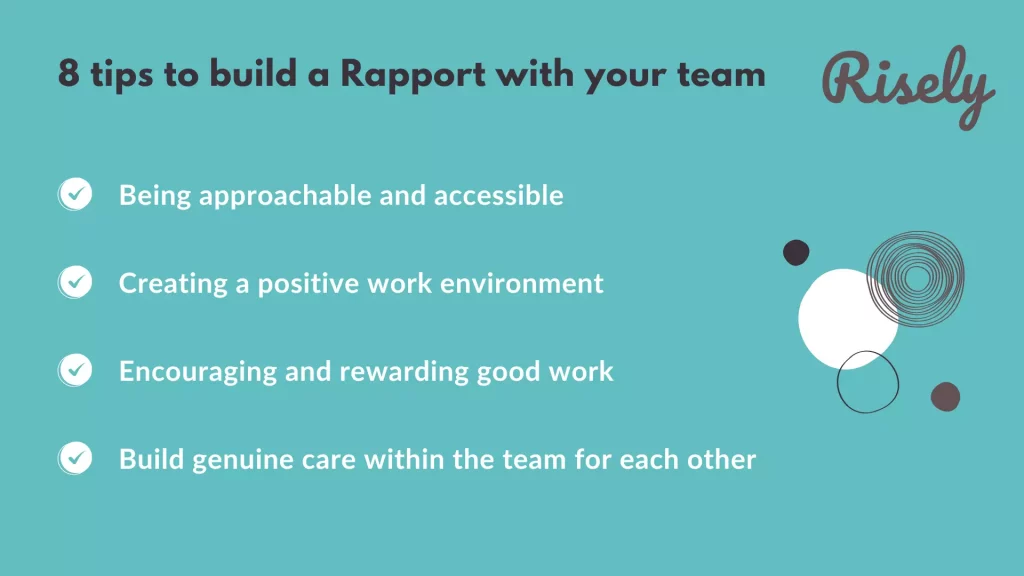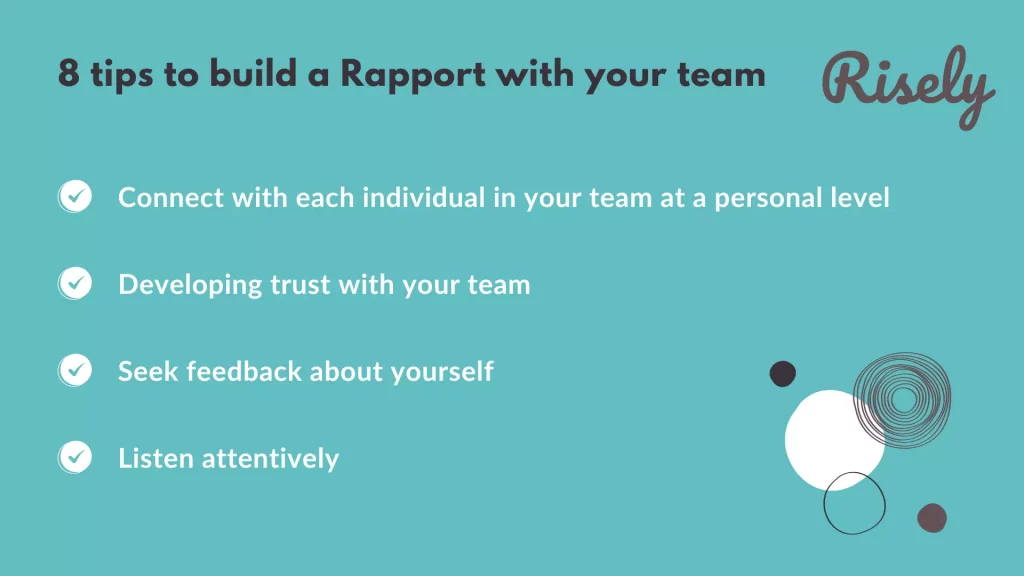How To Build A Rapport With Team members: 8 Effective Tips
Everyone is fired up to be a manager, but not all future managers are able to lead and inspire their teams correctly. The main reason for this is that managers simply don’t know the secrets of building strong team rapport. Their lack of knowledge can lead to disappointment and lack of performance, especially amongst the most crucial relationships of the organization. Understanding how to build a rapport with your team can help you become a better manager.What does it mean to build a rapport with the team?
A rapport is a relationship of mutual trust and understanding for the long term. It’s how you create a connection with another person, and it’s the first step in developing a relationship. Rapport is the ability to connect with someone on a personal level. It is the feeling of being understood and having common ground. When you build rapport with someone, you can create a connection that goes beyond the surface. You can see them for who they are and understand their motivations. Rapport is the establishment of a connection or understanding between people. To build rapport with someone, you need to be able to understand their point of view and connect with them on a personal level. It is a step up towards building great relationships with your employees and boosting their morale. For managers, building rapport with team members refers to their ability to connect securely with their team members and gain mutual understanding. It also refers to managers coming out as helpful and supportive towards the people on their team. When managers can build trust, understanding, connections, and a healthy relationship with their employees, that is what building a rapport is. This process of building team rapport is a bit time taking but is highly important for having a healthy relationship with your team. The next section of this blog post will enlighten you more about the importance of building a rapport with your team.Why should managers care to build a rapport with their team?
Rapport is key to success in any type of relationship, personal or professional. It’s what allows people to trust others, to feel comfortable around them, and to be open and honest with them. When we have a rapport with someone, we feel like we can be ourselves around them. A good rapport between a manager and their employees can be the key to a successful and productive work environment. Managers who take the time to develop a good rapport with their employees are seen as more approachable, which can encourage employees to come to them with suggestions or problems. Additionally, a good rapport can help build trust, which is essential for a healthy work relationship. Managers often forget the importance of rapport-building due to the general mindset that considers it a waste of time. They get so wrapped up in their agenda that they forget to take the time to get to know their team members. But if you want to be successful in your managerial role, you need to be able to build strong relationships with your team members or employees.Benefits of building a rapport
Taking the time to build a rapport with your subordinate team improves their productivity in the long run. When employees feel like they can trust their manager and open up about their concerns, they are more likely to be productive and cooperative. One study found that when managers took the time to build a rapport with their subordinates, it led to a 20% increase in their work efficiency. They are also more likely to be open to new ideas and suggestions and to be supportive of the manager. So, if you want to be a successful manager, taking the time to build rapport with your team is essential. All these facts and information answer the question of why should a manager build a rapport with their team. But, the next question is How can a manager build a strong rapport with their team? There are 8 secrets in total for achieving that.8 tips to build a rapport with your team

1. Being approachable and accessible
This is essential and should be done as soon as a new department or team comes into your place of work. A manager should be someone, they can approach without fear of repercussions. Being accessible helps build a rapport with employees as, you will be able to show them that whatever problem they may have or are concerned about, it is never too late for them to discuss their respective issues with you freely and openly. Also, take time out if required whenever someone requests help. A manager should not come out like a boss but as a coworker with mannerisms.2. Creating a positive work environment
This is an essential step because one of the key reasons why employees don’t engage in productive activities is an inappropriate working environment. That is one of the biggest reasons to build a rapport with the employees. When businesses have a poor working environment, employees become unable to work effectively towards their goals and organizational outcomes decrease. Creating a positive working relationship can make this process easier. The workplace should be good for employees so that they feel comfortable enough to promote productivity within your team as well as your organization. Promoting mannerisms within the workplace can be a good first step in this regard.Other Interesting Reads
3. Encouraging and rewarding good work
Encouraging good work does not happen overnight but it is possible to build a rapport based on positive behaviors. Good and motivated employees are reliable for long-term improvements in all kinds of areas including individual development, organizational capability, customer relationship competence, and effective teamwork. They will accept the authority placed upon them without resistance which shows trust and understanding which are the pillars of building rapport. It enables managers to get maximum productivity from your team while they perform at their best.4. Build genuine care within the team for each other
Managers should always be caring for their team in all possible ways. Even if it contributes to loss of income or profit. Such actions build a positive bond within the team. That makes everyone feel good about their work environment as well as each other’s performance and efficiency. This adds up to building a strong rapport between the managers and team members.
5. Connect with each individual in your team at a personal level
The best way to build a rapport with your team members is to connect with each individual on a personal level. No matter the size of your company, developing a personal connection with each employee is key to building a strong rapport. When employees feel like they are part of a team and that their work matters, they are more likely to be productive and innovative. Start by getting to know your employees as people, not just workers. Show genuine interest in listening to what their interests are, what they do outside of work (their hobbies), and what drives them.6. Developing trust with your team
Trust is the main pillar of building a strong rapport in a professional setting. As a manager, you must develop trust with your team to develop a rapport. This will also help them feel comfortable taking risks and speaking up, which will ultimately lead to better work. Building trust is a very crucial step in building a strong rapport. Once team members lose their trust, a strong rapport can never be built. A great way of doing that is by showing empathy and saying clear through your words, body language, or even your facial expressions that you are there for them and you can be trusted.7. Seek feedback about yourself
Having a common understanding of things is also one of the pillars of building a strong rapport as a manager. You can achieve that by doing active listening to or accepting direct reports of your team members’ feedback about you. When you’ll get your feedback from your employees, you’ll achieve transparency about how your team members are interpreting your inputs. By doing that you can eliminate any possible misinterpretations and achieve a common understanding of roles and responsibilities can be achieved.8. Listen attentively
One of the best ways to build rapport with your employees is by being attentive and taking them seriously. Make sure you’re following their conversation, not interrupting excessively. Then give clear responses that demonstrate that you understand what they’re saying. When you will listen to them attentively, employees will be motivated to give more input. That will not just build a strong rapport but will have a positive impact on employee engagement.To wrap things up
Having a good manager is an important factor to enjoy great work and success. But, not every manager will be able to maintain the same level of rapport with their team. It needs that special chemistry, trust, understanding, and connection. That said, we believe that if managers can understand the importance of building a strong rapport with their team members and if they can follow the 8 Important tips that are listed in this blog post, nothing will be able to stop them from building a strong rapport with their team members.Connect with your team more through effective one-on-one meetings
Download the free effective one-on-one meeting toolkit to make your meetings great
FAQs
What does building rapport mean?
Building rapport refers to the process of building trust and relationships between team members and managers. It helps teams come together to collaborate over processes and achieve more things.
– Show interest: Show genuine interest in your team members by asking about their interests, hobbies, and family.
– Communicate effectively: Good communication is key to building rapport in a team. Be clear and concise when giving instructions, and listen actively to what your team members have to say.
– Recognize and celebrate achievements: Celebrate successes and recognize achievements within the team.
– Show interest: Show genuine interest in your team members by asking about their interests, hobbies, and family.
– Communicate effectively: Good communication is key to building rapport in a team. Be clear and concise when giving instructions, and listen actively to what your team members have to say.
– Recognize and celebrate achievements: Celebrate successes and recognize achievements within the team.
What are the key elements in building rapport?
The key elements to building rapport as a team manager are:
– Mutual trust
– Open communication
– Active listening
– Mutual trust
– Open communication
– Active listening
Other Related Blogs
Workforce Forecasting: How to Set the Team Right as an HR?
Workforce Forecasting: How to Set the Team Right as an HR? As an HR manager, one of your most crucial roles is ensuring your organization has a robust and efficient…
What is Workforce Analysis? Examples and Success Factors
What is Workforce Analysis? Examples and Success Factors Workforce analysis is crucial for teams to optimize their workforce planning and management. It involves collecting and analyzing data related to employee…
How To Effectively Manage Gen Z Employees At Work
How To Effectively Manage Gen Z Employees At Work As the workforce continues to change, so too does the way in which we need to manage our employees. And that…
7 Workplace Trends 2024 for Managers
7 Workplace Trends 2024 for Managers As 2024 has almost reached its mid, workplace trends are shaping to be quite interesting. From the rise of hybrid work to the increasing…


